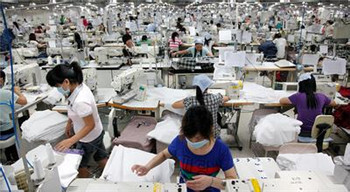
A private reading on China's manufacturing sector suggests the slowdown continued last month but that conditions had not worsened as much as in October. The Caixin-sponsored preliminary manufacturing PMI was 48.6 in November, versus expectations of 48.3. It had been 48.3 in October.
11月,由财新网(Caixin)赞助的中国制造业采购经理人指数(PMI)初值为48.6,高于预期的48.3。而10月份该读数则为48.3。读数显示上个月中国制造业活动在继续放缓,不过情况没有10月份那么糟糕。
It was last above 50 - the threshold separating contraction from expansion - in February.
该读数最后一次高于50是在2月份。对于该指数来说,是否高于50是区分制造业活动是扩张还是收缩的荣枯线。
The Caixin-sponsored series is based on a much smaller sample of private companies than the official PMI reading, which focuses on larger state enterprises, and tends to be more volatile.
这个由财新赞助的系列指数,是基于对民营企业的调查得出的,样本数目也比官方PMI指数少得多,往往波动性更大。相比之下,官方PMI指数则主要关注规模更大的国有企业。
However the prolonged period of contraction fits with the overall pattern of the slowing Chinese economy.
不过,漫长的收缩期也符合正在放缓的中国经济的总体趋势。
Less than an hour ago the official manufacturing PMI for November came in at 49.6, the fourth consecutive month of contraction and below the 49.8 reading economists were looking for. Analysts at ANZ said, in relation to that PMI series:“With soft growth momentum and deflation pressures creeping up, we expect the authorities to further ease monetary policy and continue to implement an expansionary fiscal policy in order to prevent further slowdown of the economy in 2016.”
在不到一小时前,11月中国官方制造业PMI指数公布,为49.6,是连续第四个月收缩,也低于经济学家49.8的预期。在谈到这一PMI指数时,澳新银行(ANZ)分析师表示:“由于增长势头疲软和通缩压力加剧,我们预计当局会进一步放宽货币政策并继续实施扩张性财政政策,以阻止经济在2016年进一步放缓。”












